STRIDE is a UKCISA-funded project that unpacks the social transition of PhD students and the aim of this blog is to provide public stories of students’ experiences. This week we’re sharing a story from a supervisor perspective with a post from one of our researchers – Divya Jindal-Snape from the University of Dundee. For more information about the project, please visit the ‘About the Project’ page.
Transition as an ongoing journey: My Educational and Life Transitions
Hi, I am Divya Jindal-Snape. I was born in India, did my PhD in Japan and am now Professor of Education, Inclusion and Life Transitions at the University of Dundee in Scotland. At the age of 3 I had decided I wanted to become a teacher and my academic and career journey started there. So I have been on this path for nearly 50 years and it has been an unwavering quest. Interestingly though, at a very early age, might have even been at the age of 3, I realised that the reason I wanted to become a teacher was to be a learner. Learning has always been important to me. And I am not talking about learning in its formal sense. It’s learning from everyday things. Every single encounter and interaction meant that I learned a lot. It’s easy to be a teacher and supervisor if you are open to rich learning from your students. My students have been my best teachers. And I think it’s a massive compliment as I had amazing teachers at school and university in India.
At the age of 23, I had completed two undergraduate and two postgraduate degrees. I taught in a school in India for around nine months. When that became less challenging after some time, I started working as a lecturer. And when that became less challenging after three years, I decided to go overseas and start my PhD there! So I started looking out for international scholarships. I saw one for undertaking PhD in Japan. It was the Japanese Ministry of Education (Monbusho) scholarship. I applied for it and was selected from over 120 applicants across India. I felt a great sense of responsibility.
 This started my journey to a new country with a language I didn’t know. Apart from learning Hiragana alphabet on the flight from Delhi to Tokyo! I had never been to an airport or on a plane. So my learning started there. Leaving my family for the first time- 1st April 1992.
This started my journey to a new country with a language I didn’t know. Apart from learning Hiragana alphabet on the flight from Delhi to Tokyo! I had never been to an airport or on a plane. So my learning started there. Leaving my family for the first time- 1st April 1992.
Every tiny challenge and meeting it head on was a source of joy for me. There were many more challenges throughout my time in Japan- and each one led to great learning. People usually say that must have been a culture shock for you. No, it wasn’t. I was open to learning from every new thing. Every difference became a source of learning- every learning felt like an achievement. So every day I felt I was achieving a lot. I could have seen all these encounters as ‘problems’ but having a different perspective helped me see them differently. I consciously put my identity as a university lecturer aside in Japan and immersed myself into my studies as an international student learning Japanese at the University of Tsukuba’s International Student Centre and then as a PhD student.
As an international student who had a Monbusho scholarship, I started with six months of learning Japanese which was an unbelievably exciting opportunity. The staff- academic and professional- were amazing. There were 30 international students split into five classes. We must have been from at least 25 different nationalities. We really bonded during those six months. It was amazing to be friends with people from such diverse backgrounds. Staff created a really rich environment for us to bond in.
I knew no Japanese when I got there but after six months I was asked to do a speech in Japanese to Professor Leo Esaki, the President/Principal of University of Tsukuba at our Japanese Language course’s graduation ceremony. Do you recognise his name? He got a Nobel Prize in Physics in 1973. Interestingly he had just returned to Japan after having lived in America and had started at the University of Tsukuba at the same time as me. He seemed to remember me when I shook his hand at the PhD graduation ceremony! And whenever we bumped into each other, he would acknowledge me.


I have rushed ahead to the graduation ceremony without telling you about my journey as a PhD student. The supervisor chosen by Monbusho for me was someone who was seen to be the father of inclusive education in Japan. When I had my first meeting with him he told me he was retiring in a year’s time but they would allocate me another supervisor. They chose someone who was from my field but whose main qualification was that he could speak English- interestingly I can’t really remember any conversations with him in English. My supervisor didn’t have a PhD himself and was also not undertaking much research. Although I was in the same room as him for the duration of my PhD, I received no supervision. Not only that, he seemed to get a lot of satisfaction out of putting people down. This period in my life was a difficult one but I remembered that I was a learner and that every challenge presented an opportunity to learn.
So despite his best efforts, I completed my PhD. I had a public defence and then the thesis was examined by four external and one internal examiners. For years I have worried whether my supervisor was right in putting me down and my research was not worth anything. It was only a couple of weeks ago when talking with a colleague that I realised, I had walked out of the two vivas without a single correction. Also, every part of my thesis has been published in the top journal in my field. However, having a supervisor who is not supportive can still leave you feeling that you are not good enough.

There are a couple of things that I learned and would like to pass on to you. During my PhD, I was asked by my head of department whether everything was going well with my studies- and at one point he directly asked whether I would like to change my supervisor. Not knowing the culture very well and being told by other international students that Japanese like to stick together, I made the mistake of staying with the same supervisor who contributed nothing positive and did his best to damage my confidence. I should have found out more about the regulations and system to see whether it was possible to change supervisors. Do not suffer on your own. Speak with the director of the doctoral programme or the Dean of your department. (Interestingly a few years after completing my PhD I was invited to do a keynote which was in the same room as I had my public defence. And what happened to my supervisor? I found out that he had been asked to leave the university.). My supervisor did teach me an invaluable lesson. Not to be like him. I hope my doctoral students know that I am always there to support them. Always willing to be a part of their journey- whether academic or personal. Academic study does not happen in a vacuum. The personal matters are bound to have an impact on your studies and vice versa.
Secondly, publish as you go along. When I had my public defence, I had already published one paper in the topmost journal in my field, one in another journal and had two other papers had been drafted. After the public defence, when I was invited to a meeting with what seemed like 50 or so professors at a long and never-ending table (or so it seemed), I could show the printouts of my papers. I believe that was the main reason that I walked away without any corrections. How can someone challenge your work when it has been peer reviewed at the topmost level? This was all thanks to my husband, whom I met in Japan. He was doing his postdoc in one of the research institutes. He encouraged me to publish my work during my studies. In his lab in the U.K. that had been the norm.
I made really good friends with people from Japan and across the world. One of my Japanese friend’s family literally adopted me. During the weekends I spent a lot of time with my friends and that again really helped overcome any issues with my supervisor. I should also add that there were several other staff members at Tsukuba who were extremely helpful and kind. I still keep in touch with some of them. So I had a strong support network around me. I never felt that I was alone.
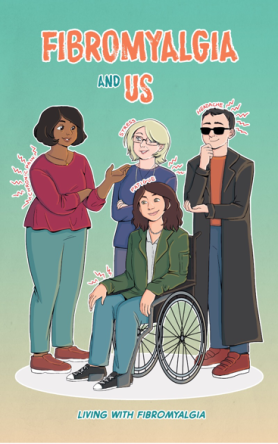 We moved to Scotland after that and have lived in Dundee for 21 years and have worked at the University of Dundee for 20 years. As in Japan, I feel at home. I am lucky to be able to call three countries my home. We have made a lot of friends and again it wasn’t a culture shock. Sometimes it was like déjà vu as I recognised things or places and realised it was due to all my childhood storybooks, teenage novels and school and university books being set in the U.K. It was lovely to visit Wordsworth’s house in Lake District for example and to sit where he’s meant to have sat and written the poem about daffodils. I have stayed in Scotland longer than I expected. Having two children can change your plans! I think I have stayed here this long as every year brings new research and new learning for me. I try to do something new all the time, the recent ones being stand up comedy and creating a comic (available here).
We moved to Scotland after that and have lived in Dundee for 21 years and have worked at the University of Dundee for 20 years. As in Japan, I feel at home. I am lucky to be able to call three countries my home. We have made a lot of friends and again it wasn’t a culture shock. Sometimes it was like déjà vu as I recognised things or places and realised it was due to all my childhood storybooks, teenage novels and school and university books being set in the U.K. It was lovely to visit Wordsworth’s house in Lake District for example and to sit where he’s meant to have sat and written the poem about daffodils. I have stayed in Scotland longer than I expected. Having two children can change your plans! I think I have stayed here this long as every year brings new research and new learning for me. I try to do something new all the time, the recent ones being stand up comedy and creating a comic (available here).
The main lessons I have learned from being an international student and international academic is that one should enjoy all the new learning that each day brings. Whether it is learning a new word or using chopsticks for the first time and managing to get at least some food in your mouth without dropping it. Make friends- lots of them. Everyone who is at the university is in the same boat- they are all looking to make friends. As an international student, you have so much to contribute. People are keen to learn from you. Take pride in who you are. Recognise and appreciate your multiple identities, whether cultural or academic. But be open to recognise and appreciate others too. In research terms, this is called socio-cultural integration and is a healthy way to adapt to the changes you will be experiencing.
Something I learned from my grandfather was to always smile and say hello to anyone you see, whether you know them or not. I have always done that and I know it works. I have been here for 20 years and so, of course, I should know most people. But there are others who have been here longer and don’t. I smile or say hello to cleaners, janitors, principal, students…everyone because they are part of my academic family. I have worked with people from all the departments at my university. Smile and say hello. Don’t wait for others to do that.
You are in a foreign country away from your family and home with the express purpose of learning. Learn to make friends along with working on your PhD. I recently met two of my dear friends, Roxana (from Romania) and Antonio (from Brazil), who met each other in Japan and are now married. This was after 25 years of not having communicated with them. Moving around the world in the days of almost no mobile phones and social media meant that we lost touch with each other. However, it was like we had never been apart. It was an unbelievably emotional moment and you can see them in the photograph with Professor Esaki above and the one below. With advancements in technology, I have now located several of my school and university friends.

Find people you can call your good, if not best, friends in future. Create special memories. They will stay with you forever. Hope you enjoy your doctoral journey. Good luck.
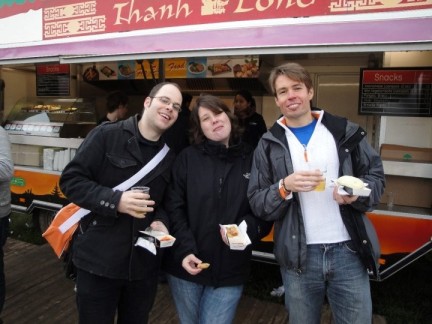





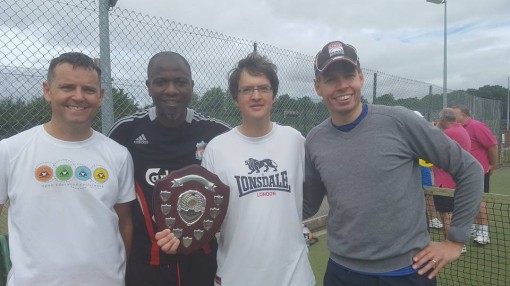

 Hi, my name is Aref Alsehaimi, and I’m from Saudi Arabia, a Middle Eastern country. I am in the final year of my PhD in the School of Education and Social Work at the University of Dundee.
Hi, my name is Aref Alsehaimi, and I’m from Saudi Arabia, a Middle Eastern country. I am in the final year of my PhD in the School of Education and Social Work at the University of Dundee. The first year was very difficult for me because my previous research experience was very limited. But, month by month, my supervisors helped me adjust by providing me with references relevant to my subject. This enabled me to overcome my initial problems, pass the transfer upgrade review, and successfully complete the literature review and plan of the research methodology. My supervisors provided crucial support and encouragement throughout this time, taking into account the circumstances under which I started my research.
The first year was very difficult for me because my previous research experience was very limited. But, month by month, my supervisors helped me adjust by providing me with references relevant to my subject. This enabled me to overcome my initial problems, pass the transfer upgrade review, and successfully complete the literature review and plan of the research methodology. My supervisors provided crucial support and encouragement throughout this time, taking into account the circumstances under which I started my research.








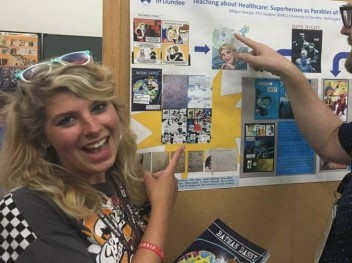 My PhD journey is at the halfway mark and my University career as a whole is nearing its end. Part of that scares me, since I was a toddler I have been in education, I have had part-time jobs here and there, but primarily being a student is all I have ever known. I am anxious what graduating will mean and if I will still maintain the strong network I have always been so fortunate to have. I know this is a fear of pretty much every PhD student however. The SGSAH have introduced me to many people at the same stage as myself, we go on annual residential events and we meet for conferences and workshops, we are all in the same situation and it is comforting to know you are not alone. In fact, no matter what happens I know I am not alone, outwith University I have an amazing support network of family and friends who help me in any way they can, whether it is reading through my stuff, walking my dog so I have more time to work, coming to my events or helping fund my projects and published work, it means the world to know they are with me every step of the way. My tutors, as wonderful and professional as they are, are also my friends as is everyone at the Comics Creative Space, my ending of this chapter is by no means the end of the relationships I have built so far.
My PhD journey is at the halfway mark and my University career as a whole is nearing its end. Part of that scares me, since I was a toddler I have been in education, I have had part-time jobs here and there, but primarily being a student is all I have ever known. I am anxious what graduating will mean and if I will still maintain the strong network I have always been so fortunate to have. I know this is a fear of pretty much every PhD student however. The SGSAH have introduced me to many people at the same stage as myself, we go on annual residential events and we meet for conferences and workshops, we are all in the same situation and it is comforting to know you are not alone. In fact, no matter what happens I know I am not alone, outwith University I have an amazing support network of family and friends who help me in any way they can, whether it is reading through my stuff, walking my dog so I have more time to work, coming to my events or helping fund my projects and published work, it means the world to know they are with me every step of the way. My tutors, as wonderful and professional as they are, are also my friends as is everyone at the Comics Creative Space, my ending of this chapter is by no means the end of the relationships I have built so far.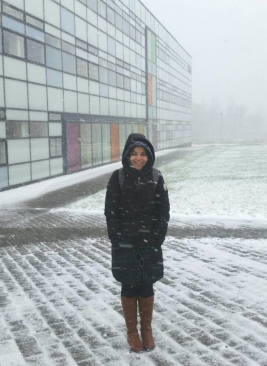 Moving to London to live with my husband three years ago was one of the most critical social transitions I have ever experienced. Fortunately, city of London turned out to be far more diverse than the city we see in most British movies (like Match Point or Notting Hill). Although London, indeed, is a city of art, culture, and history. This transition accompanied various other surprises; both good and bad. Starting from dietary changes, like getting access to hundreds of types of cheese, to eating all kinds of fruit and nut cakes, especially if you have such a talented accountant husband who could have been a fantastic baker in another world. I also learned why in English poetry, the poets always romanticize the sunshine only, and never clouds or rain; now I know why. Or for example, in my country Pakistan, if a flower is big and beautiful but fragrance-free, we would call it an English flower. Apparently, this is only a myth.
Moving to London to live with my husband three years ago was one of the most critical social transitions I have ever experienced. Fortunately, city of London turned out to be far more diverse than the city we see in most British movies (like Match Point or Notting Hill). Although London, indeed, is a city of art, culture, and history. This transition accompanied various other surprises; both good and bad. Starting from dietary changes, like getting access to hundreds of types of cheese, to eating all kinds of fruit and nut cakes, especially if you have such a talented accountant husband who could have been a fantastic baker in another world. I also learned why in English poetry, the poets always romanticize the sunshine only, and never clouds or rain; now I know why. Or for example, in my country Pakistan, if a flower is big and beautiful but fragrance-free, we would call it an English flower. Apparently, this is only a myth.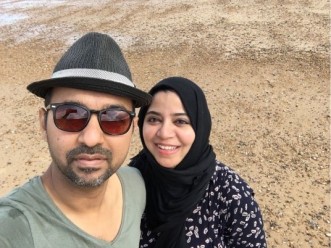 Sorry for that, I should have introduced myself in the first paragraph. I am Saman Rizvi, and I am a first year PhD student from Karachi, Pakistan. Before I relocated to the UK, I worked in academia for almost seven years, on and off, teaching and researching at five different universities. Academically, I have a background in Computer Science and before that in Applied Physics. Financially, I am from a middle-class family. But I have once studied in a primary school for a year where, in winter, we were supposed to bring a small piece of cloth to cover our seating space on a bare classroom floor. So, in a way, I felt fortunate, and privileged, after I secured this competitive PhD studentship last year. For this achievement, I owe a lot of people. My late mother, who never went to a formal school but was one of the most cultured persons I have ever met. She was able to understand, read, write (and type) multiple languages; never needed much help in installing a language software on her computer. My hardworking father who would immensely support his children in any life endeavor. The couple has left an excellent self-acclaimed-brilliant set of equally kind siblings, thriving in their fields. My teachers from back home who wrote strong references in support of my application. They also taught me well when I was enrolled in a PhD program in Pakistan. My then external, now principal supervisor, who keeps me motivated and get going all the time. Last but not least, my incredibly supportive husband who helped me complete a journal paper and a PhD studentship application in the final month of my pregnancy. He still facilitates a lot if I am due a submission deadline.
Sorry for that, I should have introduced myself in the first paragraph. I am Saman Rizvi, and I am a first year PhD student from Karachi, Pakistan. Before I relocated to the UK, I worked in academia for almost seven years, on and off, teaching and researching at five different universities. Academically, I have a background in Computer Science and before that in Applied Physics. Financially, I am from a middle-class family. But I have once studied in a primary school for a year where, in winter, we were supposed to bring a small piece of cloth to cover our seating space on a bare classroom floor. So, in a way, I felt fortunate, and privileged, after I secured this competitive PhD studentship last year. For this achievement, I owe a lot of people. My late mother, who never went to a formal school but was one of the most cultured persons I have ever met. She was able to understand, read, write (and type) multiple languages; never needed much help in installing a language software on her computer. My hardworking father who would immensely support his children in any life endeavor. The couple has left an excellent self-acclaimed-brilliant set of equally kind siblings, thriving in their fields. My teachers from back home who wrote strong references in support of my application. They also taught me well when I was enrolled in a PhD program in Pakistan. My then external, now principal supervisor, who keeps me motivated and get going all the time. Last but not least, my incredibly supportive husband who helped me complete a journal paper and a PhD studentship application in the final month of my pregnancy. He still facilitates a lot if I am due a submission deadline.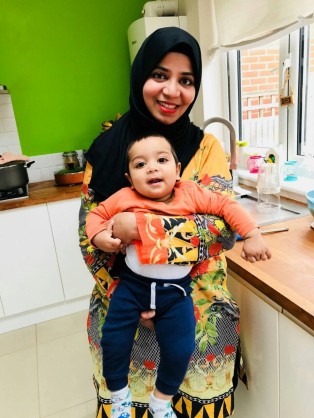 However, I sometimes think about other students who have a chance to work, research, read and write without any substantial distractions around them and wonder how lucky they are. It is only a set of well-thought-out motives you feel emotionally affiliated with, that can keep you going through difficult times. Among other motivations, I have a living, always moving, one year old, 78 cm long motivation at home. We call him Jon; extremely curious, active and a natural learner. He is not part of our lives; he is heart of our lives. Yes, he is not a distraction but just another motivation (though at times some of his actions cause natural disturbances because he has started walking and is all over the place these days).
However, I sometimes think about other students who have a chance to work, research, read and write without any substantial distractions around them and wonder how lucky they are. It is only a set of well-thought-out motives you feel emotionally affiliated with, that can keep you going through difficult times. Among other motivations, I have a living, always moving, one year old, 78 cm long motivation at home. We call him Jon; extremely curious, active and a natural learner. He is not part of our lives; he is heart of our lives. Yes, he is not a distraction but just another motivation (though at times some of his actions cause natural disturbances because he has started walking and is all over the place these days).

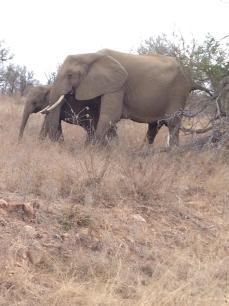




 The second transition was in the UK started in April 2015 when I had an English course for two months in Edinburgh and then started my PhD in September 2015 in Dundee. Before I arrived in the UK, I searched for current Omani or Arab students in Dundee but unfortunately, I could not find any information either on the school website or Facebook for any information, then I emailed the Omani embassy and they sent the contact numbers for all Omani students in Dundee which was very helpful to start contacting them. Contacting Omani students made the transition easy for me and the family as well. For example, when I arrived in Dundee, I found that one of them booked an appointment for a house to rent which was in the perfect location near the schools, city centre and the University. Moreover, when I started my study in the school I met other international students from different countries who were very helpful in every way they can to make my transition easy. These days with the spread of social media, Twitter and Instagram, is easy to find friends from everywhere which could positively support the transition of new students. The school has a role of supporting students which makes the transition easy for the students especially at the beginning of their studies.
The second transition was in the UK started in April 2015 when I had an English course for two months in Edinburgh and then started my PhD in September 2015 in Dundee. Before I arrived in the UK, I searched for current Omani or Arab students in Dundee but unfortunately, I could not find any information either on the school website or Facebook for any information, then I emailed the Omani embassy and they sent the contact numbers for all Omani students in Dundee which was very helpful to start contacting them. Contacting Omani students made the transition easy for me and the family as well. For example, when I arrived in Dundee, I found that one of them booked an appointment for a house to rent which was in the perfect location near the schools, city centre and the University. Moreover, when I started my study in the school I met other international students from different countries who were very helpful in every way they can to make my transition easy. These days with the spread of social media, Twitter and Instagram, is easy to find friends from everywhere which could positively support the transition of new students. The school has a role of supporting students which makes the transition easy for the students especially at the beginning of their studies.

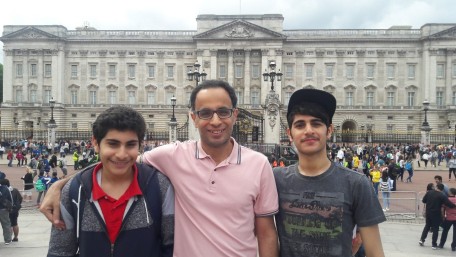
 It was then that the Open University reared its head again. I read about a studentship for a PhD which sounded amazing. But no way was I intelligent enough for that! I applied, because why not, I wouldn’t get it anyway. Then on the 1st October 2016, I enrolled on my Masters in Research Methods. Coincidentally that was the same day my mother officially left the Open University. I like to believe that the place can’t survive without a Carr on the payroll.
It was then that the Open University reared its head again. I read about a studentship for a PhD which sounded amazing. But no way was I intelligent enough for that! I applied, because why not, I wouldn’t get it anyway. Then on the 1st October 2016, I enrolled on my Masters in Research Methods. Coincidentally that was the same day my mother officially left the Open University. I like to believe that the place can’t survive without a Carr on the payroll. For me, the biggest transition has been going from shift work to an entirely self-motivated job role. There have been many days when it’s been more than a struggle to get out of bed and actually do my university work. The lack of structure has and still proves to be a massive struggle for me. Whilst not living far away, I often find it hard to force myself into the car and into university. This isn’t because I don’t like my peers, far from it. More that social interaction is often hard for me. Whilst I hate the word, introvert describes me perfectly. There is nothing I love more than my own company, but speaking to no one but myself and my dog four days a week has not proved to be good for my mental health. I’m very lucky to have a supportive family who constantly pushes me out into the real world and out of my comfort zone. Recently, I have been making sure I am better at this by slowly increasing my time at university (don’t want to push myself too quickly!). One thing that makes this easier are the people in my PhD cohort. I am lucky enough to be surrounded by interesting, friendly, wonderful people who make coming into university anything but a chore.
For me, the biggest transition has been going from shift work to an entirely self-motivated job role. There have been many days when it’s been more than a struggle to get out of bed and actually do my university work. The lack of structure has and still proves to be a massive struggle for me. Whilst not living far away, I often find it hard to force myself into the car and into university. This isn’t because I don’t like my peers, far from it. More that social interaction is often hard for me. Whilst I hate the word, introvert describes me perfectly. There is nothing I love more than my own company, but speaking to no one but myself and my dog four days a week has not proved to be good for my mental health. I’m very lucky to have a supportive family who constantly pushes me out into the real world and out of my comfort zone. Recently, I have been making sure I am better at this by slowly increasing my time at university (don’t want to push myself too quickly!). One thing that makes this easier are the people in my PhD cohort. I am lucky enough to be surrounded by interesting, friendly, wonderful people who make coming into university anything but a chore. I’ve found it great to get involved with social events where possible, such as the Christmas parties. These provide a great opportunity to get to know everyone and have a bit of fun. I’m still hoping that one day I’ll convince my boyfriend to pick me up so I can actually enjoy a drink with everyone else!
I’ve found it great to get involved with social events where possible, such as the Christmas parties. These provide a great opportunity to get to know everyone and have a bit of fun. I’m still hoping that one day I’ll convince my boyfriend to pick me up so I can actually enjoy a drink with everyone else!